Russian chef arrested in connection with ‘large-scale’ plot to destabilize France during Olympics
A Russian chef has been arrested in France in connection with a “large-scale” plot to destabilise France during the Olympic Games.
The 40-year-old man was arrested on Sunday during a raid on his apartment in central Paris, where a document was reportedly found linked to a Russian special forces unit operating under the FSB and an heir to the KGB.
A judicial investigation has now been launched into allegations of “sharing intelligence with a foreign power with the aim of provoking hostilities in France”, a crime punishable by up to 30 years in prison.
According to prosecutors in Paris, the search of the Russian national’s apartment on Rue Saint-Denis, on the right bank of the Seine, was carried out at the behest of the French Interior Ministry.
According to French media, the agents who stormed the apartment of the anonymous man discovered “elements indicating that he was preparing pro-Russian operations to destabilize France during the Olympic Games.”
Armed guards have been spotted patrolling metal barricades erected near the River Seine in Paris ahead of the start of the Olympic Games
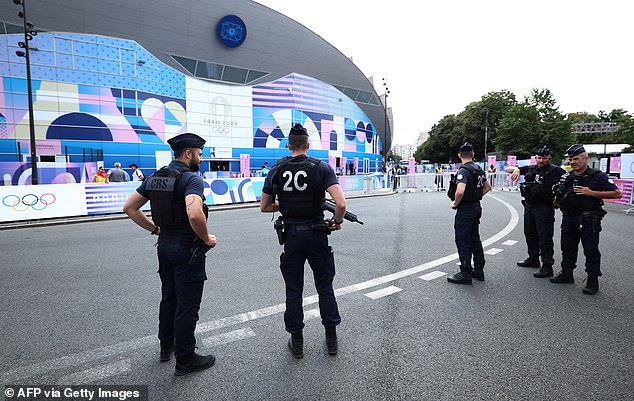
Police officers take security measures as preparations continue for the opening of the Paris 2024 Olympic Games on July 22, 2024 in Paris
Officers also found evidence suggesting the man was planning a “large-scale project” that could have had “serious” consequences during the three-week competition.
Le Monde, citing several European intelligence services, reported that authorities had found an identity card belonging to the Russian man, which showed that he worked for a unit run by Russia’s Federal Security Service (FSB).
The French newspaper also reported that intelligence services had tapped a telephone conversation between the man and a Russian intelligence officer in May.
Here they heard the suspect say that ‘the French are going to hold an opening ceremony like no other’.
Le Monde reported that after arriving in Paris in 2010, the man trained as a chef and appeared in Russian reality and cooking TV shows.
During his 14 years in France, he worked for a while in a Michelin-starred restaurant in the ski resort of Courchevel, popular with the Russian elite. In 2012, he moved to Paris.
According to emails from 2012 seen by the French outlet, the suspect had told his landlady that he would return to Moscow to work as a civil servant for the Russian government.
Intelligence services, with their growing suspicions, followed him for months and overheard a phone call to his alleged contact two months ago, when he returned to Paris from Istanbul.
He had missed his flight due to excessive drinking and had instead returned home via Bulgaria when the conversation about the Olympic opening ceremony was overheard, the newspaper reported.
French Interior Minister Gérald Darmanin said this week that authorities had screened more than a million people ahead of the Games.
“We are here to ensure that sport is not used for espionage, cyber attacks or to criticise France and the French, or sometimes even to lie about it,” Darmanin said.
The Olympic Games begin on Friday with a spectacular but logistically challenging opening ceremony along the Seine.
France has carried out the largest ever security operation to ensure safety during the Games, which are taking place against the backdrop of wars in Ukraine and Gaza.
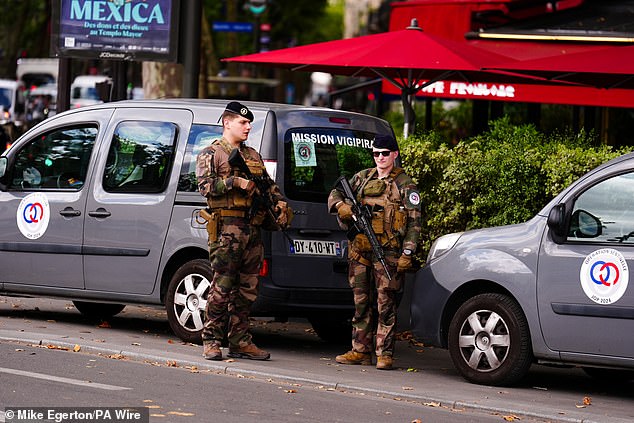
Armed guards at the Plaza de la Bastilla, Paris. The opening ceremony of the Paris 2024 Olympic Games will take place on Friday, July 26, along the River Seine.
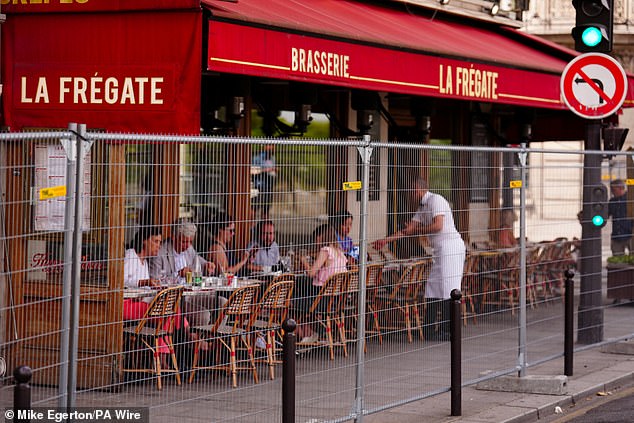
Locals were seen eating at a restaurant behind a fence in Paris, which is used as a first line of defense
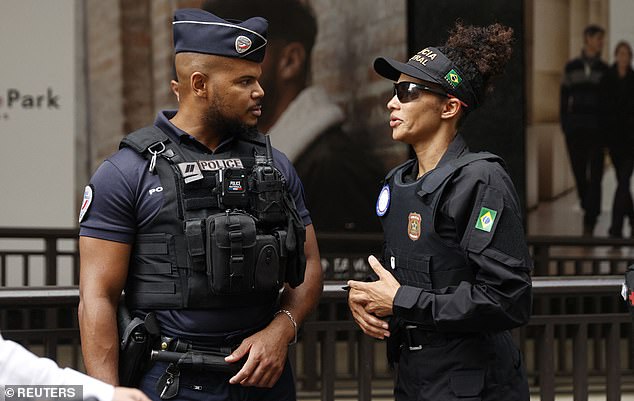
Police officers take security measures as preparations continue for the opening of the Paris 2024 Olympic Games on July 22, 2024 in Paris
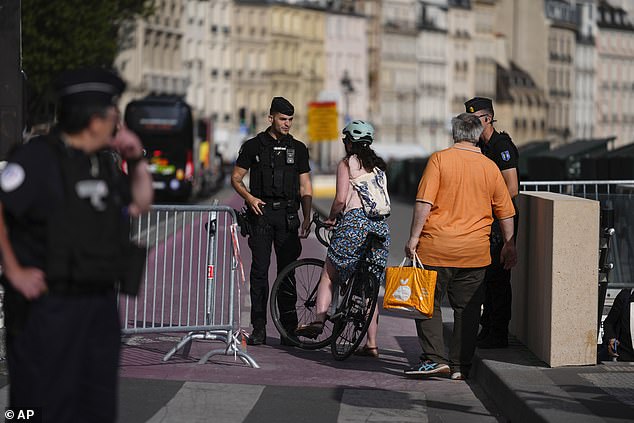
Police officers control access to roads near the Seine in preparation for the 2024 Summer Olympics
Armed guards have been spotted patrolling the city’s boulevards and sites, while metal barriers now line the Seine.
The four-mile-long metal barricade was put in place by the Paris police prefecture and will remain in place throughout the Games to prevent and deter trouble.
The anti-terrorism fence, also known as SILT (steel belt), ultimately forms the first line of defense and was first erected on July 18.
Anyone wishing to enter the protected area must scan a QR code to gain access to the closed-off part of the city.
Cars are also not allowed to enter certain zones around a number of event locations. Only emergency services are allowed to pass.
The defense system consists of a huge force of some 45,000 police officers from 43 countries and 18,000 soldiers.
In addition to human efforts, several air units will also be involved in the “unprecedented” operation, including Rafale fighter jets, AWACS surveillance flights, Reaper surveillance drones and helicopters carrying experienced snipers.
Around 1,700 members of the British police force are already supporting French officers in Paris and Marseille, as are British sniffer dogs hand-picked by French authorities.
Relations between France and Russia have been deteriorating for months, as President Emmanuel Macron is a prominent critic of Moscow’s invasion of Ukraine and a staunch supporter of the government in Kiev.
French authorities have repeatedly reported suspected Russian disinformation campaigns, while Russia has arrested a French researcher in the country on suspicion of espionage.
Last month, French police arrested a 26-year-old Ukrainian-Russian man after he blew himself up with explosives in a hotel room north of Paris.
He was being investigated by France’s domestic intelligence service on suspicion of participating in a terrorist plot and a bomb attack.
Also in June, Russia arrested French researcher Laurent Vinatier for allegedly failing to register as a foreign agent when he gathered information on the Russian military.
He is part of a growing list of foreigners held in Russia who have been caught up in the crisis in relations between Russia and the West over the war in Ukraine.
